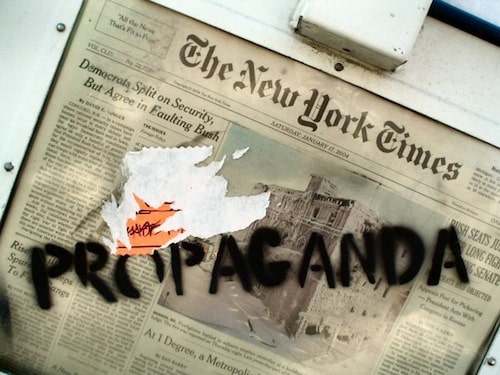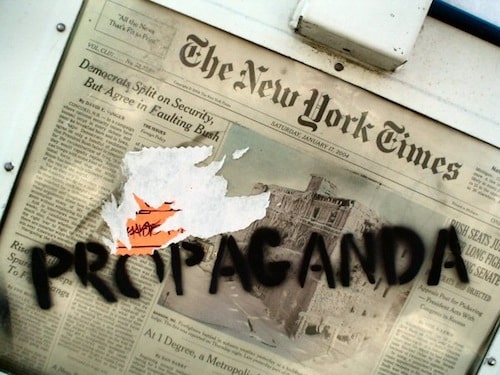
The complicity of America’s Fourth Estate in the evolution of the national security warfare state is often mentioned in passing but rarely analyzed in any detail. But a recent article on Lobe Log by Adam Johnson is refreshing in that it does just that, looking at the editorials in 26 leading newspapers relating to the April 13th strike against Syria for the alleged use of chemical weapons. All of the papers supported the attack in the belief that Syria and its Russian and Iranian allies had done something wrong and had to be punished. Some of the endorsements went well beyond the actual strike itself, urging the White House to do more. The article quotes the Toledo Blade’s assertion that:
Make no mistake, this was a warning to Vladimir Putin as well as Bashar al-Assad. The United States and its two longtime allies redrew the red line that had been obliterated by a failure of nerve by the US and the West generally: There will be cost for your barbarities…. But in the larger sense, the West did what it should have done a long time ago. It stood up for decency and international law. It stood up for those who are defenseless. It stood up for itself, and for simple humanity, and redeemed some self-respect.
Another recent editorial intended to stir up hysteria about perfidious Moscow appeared in theNew York Times on March 12th. It was entitled Vladimir Putin’s Toxic Reach. It said in part:
The attack on the former spy, Sergei Skripal, who worked for British intelligence, and his daughter Yulia, in which a police officer who responded was also poisoned, was no simple hit job. Like the 2006 murder of Alexander Litvinenko, another British informant, who was poisoned with radioactive polonium 210, the attack on Mr. Skripal was intended to be as horrific, frightening and public as possible. It clearly had the blessing of President Vladimir Putin, who had faced little pushback from Britain in the Litvinenko case. The blame has been made clearer this time and this attack on a NATO ally needs a powerful response both from that organization and, perhaps more important, by the United States.
These two stories and the many others like them have something in common, which is that they were written without any evident “fact checking” and subsequently have proven to be largely incorrect in terms of their assumptions about Russian and Syrian behavior. They also share a belief that the United States and its allies can both establish and enforce standards for the rest of the world. In these cases, the stakes were very high as there was an assumption that it could be appropriate to risk going to war with a powerful nuclear armed government based on incidents that did not in any way impact upon American or British national security.
Regarding Syria, the first wave of “reporting” on the alleged gassing came from sources linked to the terrorist group that was under attack, Jaish el-Islam. This included the so-called White Helmets, who have been outed and exposed as a virtual PR outfit for those one might call the head-choppers. More recently, with government control reestablished over the Douma neighborhood where the reported deaths took place, independent journalists including the redoubtable Robert Fisk, no friend of the al-Assad “regime,” have been entering and discovering that there appears to be no evidence that a gas attack even took place.
Skeptics examining the incident from the beginning noted that the Syrian government had every reason to avoid a provocation in its rollup of the remaining rebel pockets near Damascus while the so-called rebels would have been highly motivated to stage a false flag attack to bring in outside forces in support of their cause. If there was a chemical attack of any kind, it almost surely originated with the terrorists.
Even assuming that the United States was acting in good faith when it attacked Syrian “chemical sites” believing that the al-Assad “regime” had actually used such weapons, one should also assume, given the time frame and lack of definitive intelligence resources, that the decision was based on an assessment that relied on limited information coming from sources hostile to Damascus as well as White House perceptions of persistent bad behavior by the Syrian government.
So a poorly informed Washington clearly went to war without exactly knowing why. As the story continues to unravel, there will, however, be no apologies forthcoming either from the White House or the national media, both of which got it so wrong. The mainstream media never even questioned whether Trump should bomb the Syrian “regime” at all, instead merely debating exactly how much punishment he should inflict.
To their credit, the British public and some former senior officials are beginning to ask questions about Syria through a reluctant media filter and opposition leader in Parliament Jeremy Corbyn has refused to be silenced. Similarly, the story of the poisoning of the Skripals in Salisbury has also begun to come apart. Former UK Ambassador Craig Murray has detailed how the narrative was cooked by “liars” in the government to make it look as if the poisoning had a uniquely Russian fingerprint. Meanwhile U.S. investigative reported Gareth Porter sums up the actual evidence or lack thereof, for Russian involvement, suggesting that the entire affair was “based on politically-motivated speculation rather than actual intelligence.”
Here in the United States the mainstream media, which has supported every war since 9/11, has yet to account for its deliberately slanted reporting that has fueled both military action in Syria and reprisals against Russia over the Skripals. Unfortunately, the resulting actions undertaken by the United States and Britain have not been consequence free. The attack on Syria, given the fact that Damascus in no way threatened either the US or UK, was a war crime under international law. The mass expulsions of Russian officials over the Skripals affair has produced a diplomatic chill not unlike the Cold War, or perhaps even worse, with American UN Ambassador Nikki Haley declaring that the White House is “locked and loaded” if Syria should again step out of line. One might ask Haley what is to be done when Washington steps out of line? It would be interesting to hear her answer.
Reprinted with permission from American Herald Tribune.

